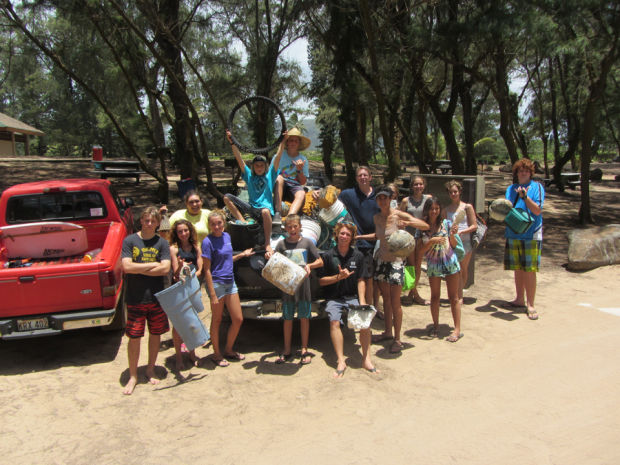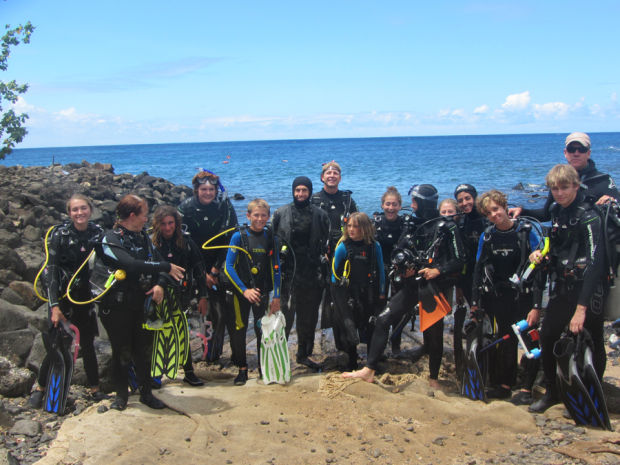LIHUE — On July 12, Malama Na Apapa and Na Opio Au Kai, held a graduation ceremony for their first Summer Marine Ecology Course.
During the first week of the course, 17 of Kauai’s youth completed their PADI Open Water Scuba Diver certification. Twelve of these students continued on for another four weeks of marine science study.
The highlights of this summer course included scuba certification, CPR and AED certification, identification and study of marine life, Under Water Photography certification, marine ecology, reef survey methods, marine debris removal and student projects.
During the first week of the course, students were certified by PADI scuba instructors Larry Widhelm, Joni Ortiz, Scott Bacon and assistant instructor David Rovinsky. Once students completed their Open Water Scuba and Under Water Photography certifications, they began the marine ecology portion of the course, which involved learning about fish, invertebrates, plankton, marine algae (limu), the importance of coral reefs and how the overall marine ecosystem depends upon having healthy, thriving corals.
This part of the course was taught by many experienced and dedicated teachers, including Kate Mink of Island School, Angela Lopez, a former science teacher at Chiefess Kamakahelei Middle School and currently a science teacher for Prairie Middle School in Aurora, Colo.,, and Scott Bacon, the director of Malama Na Apapa and island coordinator for the Eyes of the Reef program on Kauai.
Throughout the marine ecology course, the students learned how to identify and name 25 of the most common reef fish species, 22 coral species, 33 invertebrates and 15 limu species. After students learned to ID these species they were instructed how to conduct a reef survey to collect data on the abundance of these species on the reef and then, using underwater cameras, conducted a reef survey at Makua (Tunnels) Reef.
Another important subject during this course was marine debris. Students learned about the sources and impacts of marine debris and then conducted two beach clean-ups along the Nukolii coastline, removing about 800 pounds of debris.
One of the greatest threats of marine debris on our reef ecosystem is when nets or other debris gets snagged on our coral reefs, breaking, smothering and killing it. Coral reefs are home to more than 25 percent of all marine life. They are the foundation of the ocean food chain that supports the larger fish on which millions of people rely on for food and income. Healthy coral reefs also provide the beautiful locations where we snorkel, dive and surf.
Without the important ecosystem coral reefs build, our favorite sea creatures, such as turtles, sea horses, frog fish, angel fish, lobsters and octopus, would disappear.
Marine debris can also entangle and drown other marine life such as green sea turtles, seals, dolphins and whales. It can transport invasive species that take over and push out endemic species. Smaller plastic debris kills fish, birds and turtles that consume it. It has also been documented that the plastic is absorbing high concentrations of toxic chemicals that are being consumed by the fish we eat. Additionally, as Hawaii’s reefs and beaches accumulate more marine debris they lose their pristine beauty, which is one of the top assets that drive the state’s tourism economy.
During the course we were also privileged to have a few guest speakers come and present on various marine ecology related topics.
Ann Jorgenson, a marine biology instructor and a Marine Options Program co-coordinator at Kauai Community College, presented her Master’s thesis project on hermit crabs vs. aphipods, and conducted a plankton tow and plankton lab for the class.
Stephanie Kreiger, a local marine biologist and owner of Nani Moon Mead, gave a presentation on native and invasive limu and then brought us to the ocean to locate and identify over 25 types of limu.
Kumu Sabra Kauka, a Hawaiian studies teacher at Island School, shared with us the Kumulipo (Hawaiian creation chant) and the methods of observation that the Hawaiians used to study the environment.
Chris Runyon, a graduate student in marine biology at the University of Hawaii, who is studying the cyanobacteria coral infections here on Kauai as part of her Doctorate Thesis, presented on coral reef ecology and the cyanobacteria disease she has been studying on Kauai. She also took us on guided snorkel tour at Makua (Tunnels) Reef to observe the coral disease and their survey methods.
Terry Lilley, a marine biologist and videographer who has been documenting the beauty of our coral reefs, as well as the cyanobacteria coral disease, presented about some of the stressors that can negatively impact the health of our coral reefs, and also shared the importance of documenting the reefs using photographs and video so that scientists can use this to visually see the changes and share this with the public.
Through the format of this course, students where able to develop their knowledge of marine ecology through classroom lectures, then reinforce their knowledge and broaden their comprehension of these science principles by using them in a hands-on science experiment in the marine ecosystem. Getting out into the field brings science to life for the students and shows them science is fun, interesting and relevant. The students experienced how science taught in the classroom is applied outside in the real world. At the same time, students also gained awareness and connection to their surrounding environment and learned how they can preserve the environment through stewardship.
We would like to give a special thanks to the Hawaii Tourism Authority and Hawaii Community Foundation for awarding Malama Na Apapa a grant from the Hawaii Tourism Authority’s Natural Resource Program. This grant made it possible for MNA to conduct the Summer Marine Ecology Course. We would also like to give a special thanks to Island School for providing the use of their facilities to conduct our in-class training. We also thank Kayak Kauai for their kind donation to MNA in support of the Summer Course.
Congratulations to our graduates.
If you are interested in volunteering to help MNA, email your contact information to Scott Bacon at scottbacon@kauaicoral.com, and you will be added to our mailing list to participate in future activities, such as beach clean-ups, in-water clean ups, Eyes of the Reef training and reef survey training.



